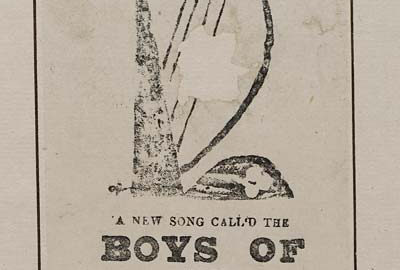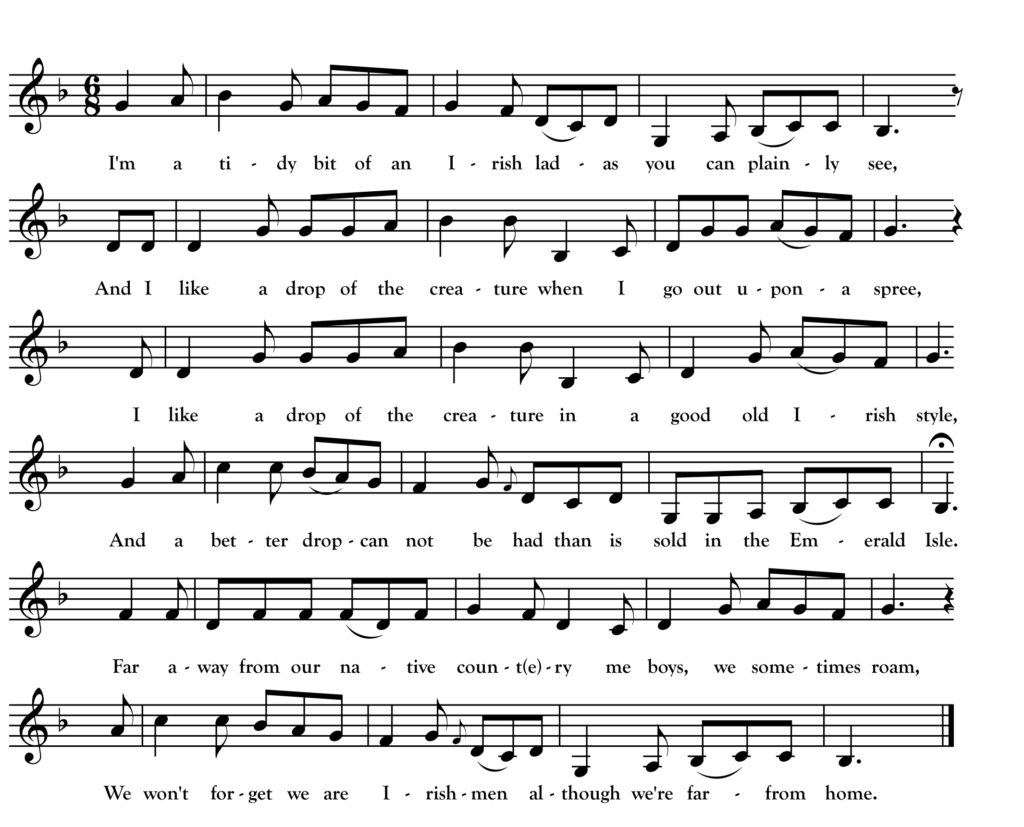Leaving Erin

[Oh] farewell, Erin, I now must leave you for to cross the raging main,
Where cruel strife may end my life and I’ll ne’er see you again;
It will break my heart from you to part, Arrah Cushla Asthore Machree,
But I must go full of grief and woe to the shores of America.
Chorus—
So now, farewell, I can no longer dwell in Ireland, Acushla Machree,
For I must go full of grief and woe to the shores of America.
On Irish soil my parents dwelt since the time of Brien Boru,
They paid their rent and lived content, convenient to Killaloo
But the landlord cruel sent us ashule, my poor old mother and me,
He banished us from home far away to roam to the wilds of America.
No more at the churchyard, Asthore Machree, on my father’s grave can I kneel,
The rich man knows but little of the woes that the poor man has to feel;
When I look around on the little spot of ground where the cabin used to be,
I may curse the laws that have gave me cause to depart for America.
Where are the neighbors kind and true that were once our country’s pride?
No more they are seen at the fair on the green or dance on the green hillside;
It is the stranger’s cow that is grazing now where the poor man used to be,
With notices they were served and turned out to starve or banished to America.
Oh, Erin Machree, must your children be exiled all over the earth?
Must they think no more of you, dear land, as the spot that gave them birth?
Must the Irish yield to the beast of the field, Arrah no, Cushla Asthore Machree,
They’re coming back in ships with vengeance on their lips from the shores of America.
This month’s song is another rare one from Michael Dean that, much to my delight, also turned up in a handwritten manuscript belonging to Patrick Hill of Tipperary/St. Paul at St. Thomas’ O’Shaughnessy-Frey Library. Pat Hill called it “The Emigrant’s Farewell” and his text is very similar to Dean’s.
Since Dean and Hill only left us the song’s text, I have searched high and low for a recording or hint at the melody that they might have sung. I have come up empty handed in all the song archives and song books I have found.
The best I could do was a melody printed in O’Neill’s Music of Ireland in the “Airs, Songs” section titled “Curse the Laws That Gave Me Cause.” O’Neill attributes the wordless melody to West Cork native and Chicago police sergeant Michael Hartnett. O’Neill’s title matches a line in verse three of our song and I think it might be a match. As Paul de Grae notes, the air is a variant of that often used for “The Lowlands of Holland.” It doesn’t feel like an obvious fit for “Leaving Erin’s” poetic structure but I did a bit of tweaking and the result, above, works pretty well.
The text itself is fascinating. It appears as “The Emigrant’s Farewell” in Hyland’s Mammoth Songster (Chicago, c1901) and the listing in that book’s table of contents implies it was a composition of “Mrs. Norton.” This has to be English social reformer and poet Caroline Elizabeth Sarah Norton, Lady Stirling-Maxwell née Sheridan. Caroline (1808-1877) lived in England her whole life but was a member of the prominent Anglo-Irish Sheridan family, She was a cousin to famed author Sheridan Le Fanu and the sister of Lady Dufferin. Lady Dufferin wrote “The Lament of the Irish Emigrant” which became quite popular with Irish singers and was also printed by Dean here in Minnesota.
Earlier printings (the earliest dated one I found was 1869) call this month’s song “An Irishman’s Farewell to his Country.” A note in Irish Literature Volume 8 (1904, edited by Douglas Hyde and others) says: “This ballad made its appearance during the time of the Fenian excitement in 1865, when the peasants expected an expedition from the Irish in the United States.” Michael Dean was an 8-year-old in northern New York state in 1866 when armed Fenians crossed the Niagara River into Canada to strike a blow against Great Britain. Perhaps the song was popular among the Irish railroad workers and lumberjacks he encountered there before heading west.



